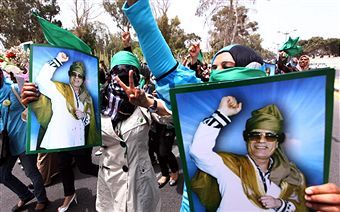 The pressure is being turned up on Colonel Gaddafi, but it may still take a while to have an effect. The Libyan
dictator retains some form of power and has told the only person who has been granted access to see him, South Africa’s Jacob Zuma, that he intends to stay on in Libya. He wants a ceasefire before
anything else is discussed. The rebels in Benghazi, meanwhile, want him to go before anything else is discussed. And so the bombing goes on.
The pressure is being turned up on Colonel Gaddafi, but it may still take a while to have an effect. The Libyan
dictator retains some form of power and has told the only person who has been granted access to see him, South Africa’s Jacob Zuma, that he intends to stay on in Libya. He wants a ceasefire before
anything else is discussed. The rebels in Benghazi, meanwhile, want him to go before anything else is discussed. And so the bombing goes on.
At the UN, people talk of negotiated settlement, fearing that chaos would follow Gaddafi’s killing. That may be true, but there has been little evidence so far that the colonel is willing to negotiate in anything approaching good faith. Talking for the sake of talking does not work if one side uses the respite in the campaign to build up his forces, which seems to be Gaddafi’s aim. What is very unclear is how security will be maintained in an immediate post-Gaddafi Libya. There is no appetite for a UN peacekeeping force and neither NATO nor the African Union can send monitors, as they are distrusted by each side. So another nation will need to provide the backbone of a (lightly armed) post-hostilities monitoring mission. Two candidates for the task are India or Australia, who could work under some form of UN mandate, if China and Russia could be made to agree to one.
The lessons from Iraq are clear: governments should plan, in extraordinary detail, for a range of contingencies even those the political leadership find unpalatable at the moment.






Comments